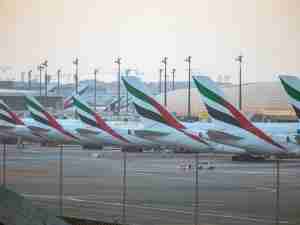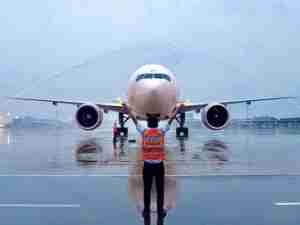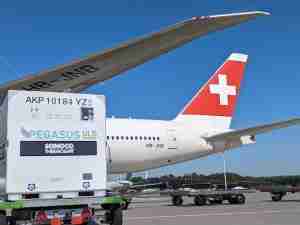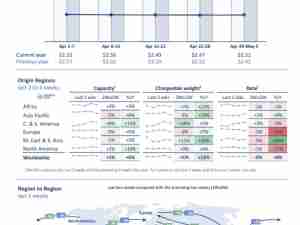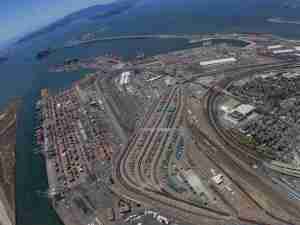Fraport releases November traffic figures
posted by AJOT | Dec 10 2015 at 10:24 AM | Air Cargo
Lufthansa's Strike Strongly Impacts Traffic Statistics at FRA - Group Airports Record Mixed Results
Frankfurt Airport's (FRA) traffic in November 2015 was impacted strongly by Lufthansa's flight attendant strike. The week-long walkout and its effects on the days following the strike resulted in about half a million passengers being unable to start their journeys at FRA - as well as the cancellation of 3,400 scheduled flights. Thus, Frankfurt Airport's passenger volume decreased significantly in the reporting month by 11.3 percent to 3.9 million compared to the same month last year. The trend was also reflected in the 10.2 percent drop in aircraft movements to 33,337 takeoffs and landings. The accumulated maximum takeoff weights (MTOWs) fell by 7.8 percent to some 2.2 million metric tons, while Frankfurt's cargo throughput (airfreight and airmail) slipped by 3.6 percent to 195,505 metric tons.
Overall, Fraport AG's international airport portfolio achieved mixed results in November 2015. Slovenia's Ljubljana Airport (LJU) welcomed 93,944 passengers, a noticable gain of 11.2 percent. Serving 1.4 million passengers, Lima Airport (LIM) in the capital of Peru recorded strong growth of 8.9 percent. The Bulgarian Black Sea airports of Varna (VAR) and Burgas (BOJ) rose slightly by 1.1 percent to 40,668 passengers. Antalya Airport (AYT) in Turkey registered 1.1 million passengers, down 3.4 percent year-on-year. Influenced by the weak local economy, St Petersburg's Pulkovo Airport (LED) in Russia experienced a 14.6 percent drop to 797,257 passengers. At Hanover Airport (HAJ) in northern Germany, traffic declined by 5 percent to 381,986 passengers. China's Xi'an Airport (XIY) greeted 2.6 million passengers, representing a 9.5 percent traffic surge. Print-quality photos of Fraport AG and Frankfurt Airport are available for free downloading via the photo library located in our Press Center on the Fraport Web site. For TV news and information broadcasting purposes only, we also offer free footage material for downloading.
Fraport AG - which ranks among the world's leading companies in the global airport business - offers a full range of integrated airport management services and boasts subsidiaries and investments on four continents. In 2014, the Fraport Group generated sales of EUR2.4 billion and profit of about EUR252 million. Last year more than 108.5 million passengers used airports around the world in which Fraport has more than a 50 percent stake.
At its Frankfurt Airport (FRA) home base, Fraport welcomed about 60 million passengers and handled some 2.2 million metric tons of cargo (airfreight and airmail) in 2014. For the current winter timetable, FRA is served by 88 passenger airlines flying to 247 destinations in 100 countries worldwide. More than half of FRA's destinations are intercontinental (beyond Europe) - underscoring Frankfurt's role as a leading hub in the global air transportation system. In Europe, Frankfurt Airport ranks first in terms of cargo tonnage and is the third-busiest for passenger traffic. With about 55 percent of all passengers using Frankfurt as a connecting hub, FRA also has the highest transfer rate among the major European hubs.
Frankfurt Airport City has become Germany's largest job complex at a single location, employing more than 80,000 people at some 500 companies and organizations on site. Major new real estate developments - such as The Squaire, the Gateway Gardens business park, and the Mönchhof Logistics Park - are creating an exciting new dimension and range of services at the evolving Frankfurt Airport City of the 21st century.
Almost half of Germany's population lives within a 200-kilometer radius of the FRA intermodal travel hub - the largest airport catchment area in Europe. FRA Airport City also serves as a magnet for other companies located throughout the economically vital Frankfurt/Rhine-Main-Neckar region. Thanks to synergies associated with the region's dynamic industries, networked expertise, and outstanding intermodal transportation infrastructure, FRA's world route network enables Hesse's and Germany's export-oriented businesses to flourish in global growth markets.
Frankfurt Airport meets the increasing needs of the export-oriented economies of the State of Hesse as well as Germany as a whole, for optimal connections to growth markets around the globe. Likewise, FRA is a strategic gateway for companies wanting to access the huge European marketplace. Thus, Frankfurt Airport - which is strategically located in the heart of Europe - is one of the most important hubs in the global logistics chain.
